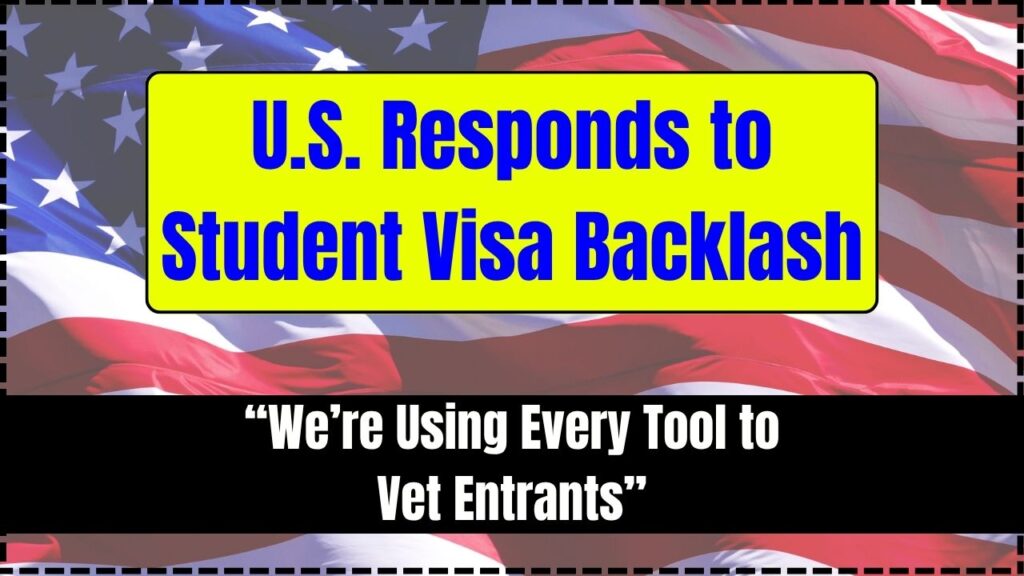
U.S. Responds to Student Visa Backlash: In a significant policy shift, the U.S. government has temporarily halted the scheduling of new student visa interviews at embassies and consulates worldwide. This pause is to prepare for the implementation of expanded social media vetting for all international student applicants. A diplomatic cable signed by Secretary of State Marco Rubio instructs consular sections not to add any additional student or exchange visitor (F, M, and J) visa appointment capacity until further guidance is issued.
This policy is part of a broader effort by the Trump administration to intensify scrutiny of international students. The administration has also taken actions against universities, such as revoking Harvard University’s ability to sponsor foreign students, although this decision has been temporarily blocked by a federal judge . Additionally, the Department of Homeland Security has begun screening visa applicants for antisemitic content on social media, citing executive orders aimed at addressing antisemitism
U.S. Responds to Student Visa Backlash
The U.S. government’s decision to pause new student visa interviews reflects a broader initiative to enhance national security through expanded vetting processes. While this may cause temporary disruptions for prospective international students, staying informed and proactive can help navigate these changes effectively.
| Topic | Details |
|---|---|
| Policy Change | Temporary halt on new student visa interviews to implement expanded social media vetting. |
| Affected Visas | F, M, and J categories. |
| Reason | Enhanced national security measures and scrutiny of international students. |
| Impact on Universities | Potential financial strain due to decreased international student enrollment. |
| Legal Actions | Harvard University’s ability to sponsor foreign students revoked; decision temporarily blocked by a federal judge. |
| Official Statement | Secretary of State Marco Rubio emphasizes the use of “every tool” to assess visa applicants. |
| Estimated Financial Impact | International students contribute over $40 billion annually to the U.S. economy. |
| Source | U.S. Department of State |
Understanding the New Policy
What Is Social Media Vetting?
Social media vetting involves reviewing applicants’ online social media activity as part of the visa application process. The goal is to enhance national security by identifying potential threats. This includes analyzing posts, likes, shares, and affiliations that may indicate extremist behavior or sentiments considered contrary to U.S. interests .
Why the Sudden Change?
The Trump administration has expressed concerns about the potential for foreign students to engage in activities that may threaten national security. The expanded vetting process aims to ensure that individuals entering the U.S. for educational purposes do not pose such risks .
Impact on Educational Institutions
Financial Implications
International students contribute significantly to the U.S. economy, with estimates exceeding $40 billion annually. A decrease in international enrollment could financially strain universities, particularly those heavily reliant on tuition from foreign students .
Case Study: Harvard University
Harvard University faced direct action when the Department of Homeland Security revoked its ability to sponsor foreign students. This decision was temporarily blocked by a federal judge, but it highlights the administration’s willingness to take stringent measures against institutions .
Navigating the New Landscape As U.S. Responds to Student Visa Backlash: A Step-by-Step Guide
- Stay Informed: Regularly check official sources like the U.S. Department of State for updates on visa policies.
- Review Social Media: Ensure your social media profiles reflect appropriate content, as they may be reviewed during the vetting process.
- Consult Educational Institutions: Reach out to the international student office at your prospective or current institution for guidance.
- Seek Legal Advice: If uncertain about how these changes affect you, consider consulting an immigration attorney.
After Harvard Controversy, Is a Crackdown on International Students Coming? Here’s What Trump Said
Why House Republicans Are Quietly Nervous About Trump’s ‘Big Beautiful Bill’
Massive Dutch Fund Issues Warning to U.S. Managers; What’s Behind the $65 Billion Power Move?
Frequently Asked Questions (FAQs)
Q1: Does this policy affect all student visa applicants?
Yes, the temporary halt on new interviews applies to all F, M, and J visa applicants.
Q2: Are previously scheduled interviews canceled?
No, interviews that were already scheduled will proceed as planned.
Q3: How long will the pause last?
The duration is currently unspecified; applicants should monitor official channels for updates.
Q4: What content on social media could affect my application?
Content that may be perceived as extremist, antisemitic, or threatening to national security could impact your application.











